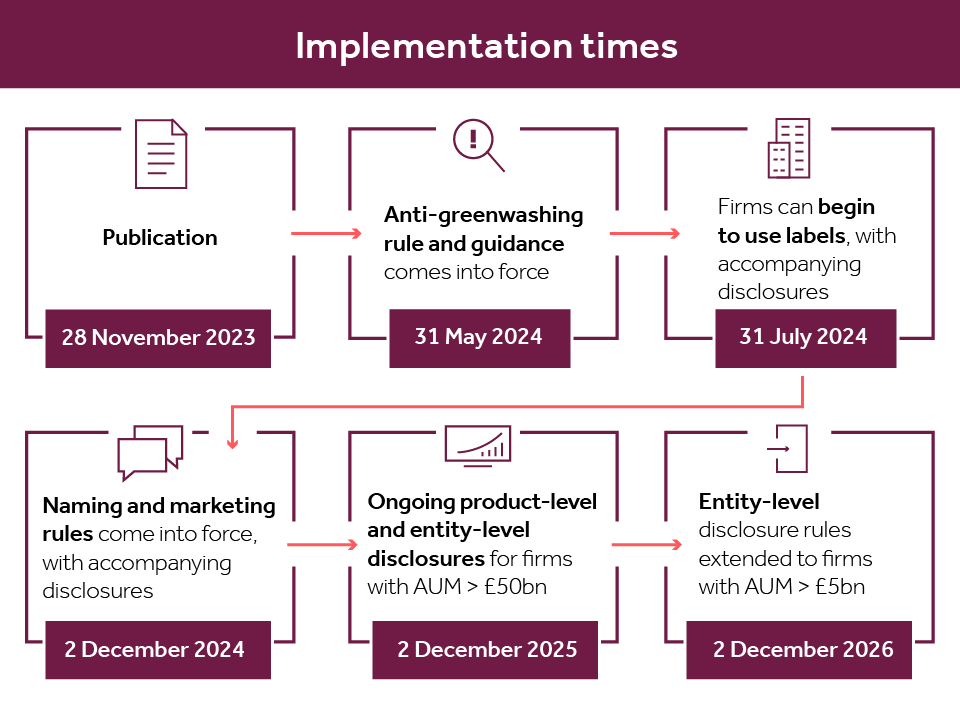We have introduced a package of measures to improve the trust and transparency of sustainable investment products and reduce greenwashing. Read more about what this means for your firm.
On this page 
Who this is for
We have introduced rules and guidance to help consumers navigate the market for sustainable investment products.
These are:
- An anti-greenwashing rule that applies to all FCA-authorised firms who make sustainability-related claims about products and services.
- Investment labels, disclosure and naming and marketing rules that apply to UK asset managers.
- Targeted rules that apply to distributors of investment products to retail investors in the UK.
See our Policy Statement Sustainability Disclosure Requirements (SDR) and investment labels policy statement (PS23/16) for more information, including Annex 2, which sets out an overview.
How this affects firms
We set out below how firms should consider the regime and, where relevant, take steps ahead of the rules coming into effect. This is not an exhaustive list.
All authorised firms should:
- Prepare for the new anti-greenwashing rule if they make claims about the sustainability of their products or services, to ensure claims are fair, clear and not misleading
- Read our accompanying consultation (GC23/3) on further guidance to the anti-greenwashing rule. The consultation has now closed.
UK asset managers should:
- Familiarise themselves with the regime, summarised in Annex 2 and set out in full in Appendix 1 of PS23/16.
- Prepare to meet the relevant requirements in the implementation timeframes.
This includes:
- Considering if they wish to label products that aim to achieve positive sustainability outcomes. If so, assessing whether the relevant products meet the qualifying criteria.
- Assessing their products against the naming and marketing requirements and preparing to make any changes needed.
- Preparing the relevant consumer-facing disclosures, detailed product-level disclosures and other statements where relevant.
Carrying out associated actions such as:
- Following the usual fund authorisations and amendments process. The FCA will not be approving use of labels.
- Notifying the FCA of use of a label through a form on our online notification and applications system.
- Preparing for ongoing actions including annual reviews, updating relevant disclosures, and the steps to be taken when changing a label.
All distributors should:
- Prepare to make the labels and consumer-facing disclosures available as soon as reasonably practicable to retail investors, and to keep them up to date following changes made by the firm.
- Where relevant, prepare to add a notice on overseas funds to inform consumers that they are not subject to the regime.
More information about what this means for you
We will update the following section to provide clarification to firms on common queries.
Implementation timeframes
The rules and guidance come into force on the following dates:

In particular
Investment labels
We are introducing 4 investment labels for products with sustainability objectives that aim to improve or pursue positive outcomes for the environment and/or society. For a summary of the criteria, see Annex 2 of PS23/16. This section covers responses to some of the common questions we have received so far. It is not exhaustive.
General
Our rules do not set out any specific requirements for a ‘fund of funds’. Where a fund in scope of the regime invests in other funds, those funds will be treated as ‘assets’. The rules apply as usual to the authorised fund, so the the firm is responsible for ensuring the labelling criteria for the fund of funds is met and must make the associated disclosures or comply with the naming and marketing requirements.
We are not being prescriptive around how certain assets should be treated. If firms determine that sovereign bonds, derivatives, or other assets, meet or have the potential to meet a robust, evidence-based standard of sustainability they can be in the part of the product that pursues the sustainability objective. Otherwise, they can still be included in the product provided that the firm discloses the type of asset held and why.
The robust evidence-based standard must be an absolute measure of environmental or social sustainability.
However, for the Sustainability Improvers label, the methodology or approach to select assets may be a relative measure or approach eg, selecting the ‘best-in-class’ for a particular sector.
Naming and marketing
Scope
Firms using sustainability-related terms only need to meet the additional naming and marketing requirements (including on product naming and producing the associated disclosures and statement) in respect of products for retail clients.
All firms are required to comply with the anti-greenwashing rule and must ensure their sustainability references are fair, clear and not misleading and proportionate to the sustainability profile of the product and service.
Exceptions
Firms can use sustainability-related terms in other contexts where not referring to sustainability characteristics, for example ‘economic climate’ or ‘financial impact’.
Another exception is where a firm is only making short, factual, non-promotional statements, for example a statement that it carries out ESG integration on the product as part of its usual risk management process. However, if, for example, ESG integration or another sustainability-related investment approach is being promoted in its marketing as material to the product, the firm will be required to produce a disclosure and statement to clarify why the product doesn’t have a label.
The purpose of these exceptions is to avoid firms being brought into scope of the rules if they are simply referencing sustainability-related terms in a non-promotional way. The naming and marketing rules are for the use of sustainability-related terms in financial promotions relating to the sustainability characteristics of a particular product. Other materials produced by firms that include sustainability references are likely to be captured by the anti-greenwashing rule.
